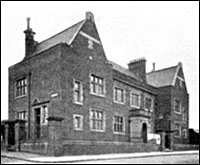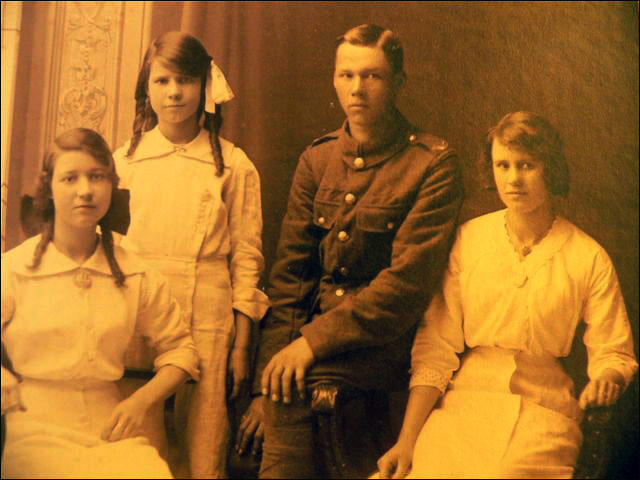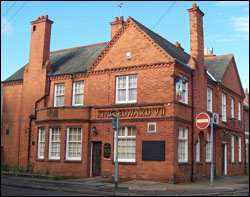|
|||||||||||||||
| As told to her son, Paul Roberts in 1996 |
|||||||||||||||
|
Wartime Memories - Doris Watts 1918
|
|||||||||||||||
|
The following are the remaining memories that were told to me. Mother died before we could complete them. These are the notes from which I would have written-up and discussed and would then have been the final memories of Rushden. I always changed Mother's library books (good English murders) and when the cataracts impaired her eyesight, I took out the Talking Books. I not only had to pick a good murder but study the actor or actress reading the book. When I started the memories I wanted to use a tape recorder; Mother would not agree - she said that people listening would know that she had false teeth! Letter to the Evening Telegraph 1993. Sir Peter Fry, the MP for Wellingborough Parliamentary Constituency, advocated birching for young offenders. The following is the reply that Mother immediately sent to 'Letters' of that evening newspaper. I had showed her how to use the 'phone-in' number for letters to the Editor. My Mother would always get angry at advocates of flogging. I had a young brother, Reg, who was birched for scrumping apples from an orchard in Rushden when he was about ten years old. He was held by two large policemen (police were big in those days) & Reg was undersized for his age. Mother was very distressed and Father found it hard to take. I can recall sitting at our home, 96 Cromwell Road, Rushden and the tense air, waiting far Reg to come home. When he did, he put on a brave face and said it did not hurt. He showed us his wheals from the birch. Reg's attitude & character changed and he got into more trouble. He died at Easter 1918 in a Reformatory in London during the great ’flu epidemic and was buried in a mass grave. I went with my Father to his funeral. That same day our new baby died. I hope that those who want to bring back the birch never have to live through the ordeal of that day Reg was birched and the result that followed. Mrs. D.C.Roberts. Aged 97. Recalling this memory, I pointed out to my Mother that the orchard that Reg went scrumping in (with other boys) and was caught belonged to Mr. Coe. It had not occurred to Mother that it was Mr. Coe's orchard. Does this explain his concern for Mother when she worked for Mr. Coe at Coe & Green's factory? Mother said that her father told her that when he worked at Jimmy Hyde's factory and Reg got into trouble, he went to the river at Ditchford intending to drown himself. He said that "When I reached Sanders' Lodge I realised what a mess I would leave her and the kids in and I turned back". Her Father would always send sweets and chocolate to Reg in the Reformatory but he never did to Tom in the Army. Talking over the trouble that Reg was in the second time Mother said that "If Reg had been a Roberts at Ringstead or Raunds he would not have been treated so. Father was out of his depth in the matter". With some friends Reg was in Rushden High Street when he claimed that they had found some money. This they went and spent. A woman lost her purse. The Police alleged that the money Reg found was actually stolen from the woman's basket. Reg was found guilty and not believed. The woman was a Mrs. Hill; it was unclear who Mrs. Hill was, but 'some relation'. I believe that Mrs. Hill was either her Aunt Emily, Grandmother's eldest sister, who married a Hill or possibly Emily's Mother-in-law; yet the Hills came from Sheffield. Emily was widowed a few years after the marriage and the Hills pass out of the family's recollection. At Raunds for some years until the I970's there was a laundry in Raunds that closed down. The manager was a Mr. Hill. Mother remarked on reading the item in the Evening Telegraph that Mr. Hill was a cousin. I also understand that Mrs. Hill was very distressed when she found out who was being charged with her loss. The shopping basket in those days was the deep oval wicker type. Women usually kept their purse on the top of the goods in the basket.
Following the second trouble, Reg was sent to work in a Birmingham hotel. The hours were from early morning to midnight. He ran away and came back home to Cromwell Road. He was picked up and then sent to the London Reformatory. Aunt Beat (Grandmother's sister-in-law, Beatrice Denton) with her better education and experience of service, wrote an angry letter to the proprietors of the Hotel about their treatment of the boy. Mother and her Father attended the funeral of Reg at London. Her Father only spoke once to her all day and that was to give her some money to buy some fish and chips for her lunch; Mother said she never knew where her Father went during that hour and he did not tell her. After the funeral the head of the Reformatory invited them to lunch, but her Father bluntly refused to dine with him, turned his back and walked away. When they alighted from the train at Irchester station one of the younger children met them to inform them that the new-born baby had died. Mother said that her Father cried out "Oh God" and held his head in his hands. On a visit to London, before their marriage, my father and mother visited the part of London where the Reformatory was and my father searched and found the grave of Reg and Mother placed some flowers on the site. Mother left the Church of England and attended the Mission Church in Brookfield Road (on the corner with the Wellingborough Road). One of the reasons was that she and her sister Elsie had only a best coat to wear over their dresses. Also Mother felt inferior by the churchgoers. At the Mission Church she felt accepted and welcomed. Jimmy Hyde's factory is opposite the junction of Brookfield Road and Glassbrook Road. It would seem that Mother joined the Mission Church when she worked at Jimmy Hyde's. Her Father also worked at the firm it would seem, during the war, when he told Mother of going to drown himself at Ditchford During those years Mother took classes in the Bible as a teacher. I have her Bible and Hymn book - inside it reads: Wellingborough Road Mission Sunday School RUSHDEN Presented to Doris Watts Armistice Day was always painful for my Mother. Tom, who had served through most of the war, was killed in France a fortnight before Armistice Day. The notification of which arrived a few days before November 11th. Grandmother sat under the stairs with her head buried in her apron, too grief-stricken to cry. Her Father had gone out of the way. The younger children were crying out for bunting to hang outside the house like all the other houses in Cromwell Road; Mother and Elsie had to organise, for several days, the feeding and running of the house. Later that evening she and Elsie went down the High Street to watch everyone celebrating the end of the War. They crept along in the shadows of the shops. Mother would never have the Armistice Day Service played on the radio. On that Sunday she would always shut herself in the kitchen. 1918 was a year of suffering for 96 Cromwell Road, Rushden. The military situation in the Dardenelles resulted in the Territorial Army being sent to that battlefield. In 1915 seven boys in Cromwell Road, who were in the Territorial Army, held a house party to celebrate being sent with the Territorials to the Dardennels. One boy asked his Mother to speak to Grandma for her permission to write to my Mother whilst he was away. At the end of the parry the boys sang to my Mother the song "Goodbye Nellie Grey"; they changed the Nellie into Dolly! Tom served in the Artillery and served on the Western Front - a German shell landed in the redoubt of their big gun killing all the artillerymen. Both Mother and Elsie recalled that only one of the boys came back. He was 'young Billy', who was a sergeant in the Territorials. Young Billy was stepbrother to Grandma. He was responsible for getting Tom into the Territorials as he, Tom, was under age. Tom wore the redcoat of the Territorial Army of those days. He was very proud of his redcoat. Young Billy died a few years after returning home. When I asked My Mother and Aunt Elsie what he died of they were silent, thinking. Then at last Aunt Elsie said, "Well, he never got over it". They would often talk of Rushden boys they had known and always ended saying "but he never came back". After the war Mother accompanied Grandma on visits to the Spiritualist church. Many women attended trying to establish contact with lost husbands, sons or sweethearts. Grandma always felt, that if there were anything in Spiritualism, Tom would try to get in touch with her. One visit a woman in Cromwell Road who had lost a son was told that come the spring there would be a family reunion. In the spring her daughter died. My Father accompanied Grandma and Mother on several occasions. At one Meeting the Medium turned to my Father and said, "Freddie wants to speak to you". He could recall no one of that name. The Medium said, "Freddie is very distressed". Later Father recalled that it would have been Freddie Cunningham, a school friend from Ringstead days who was drowned in the locks on the river at Ringstead when, as boys about eleven years old, they were swimming there. (The witness of the first Roberts' marriage at Ringstead in 1789 was William Whitsey Cunningham. Freddie was his direct descendant) Twenty years after Tom's death, at Higham Ferrers Feast Sunday in 1938, we sat at tea at Aunt Phyllis's house. Grandma said that she believed that Tom was alive, but badly disfigured and stayed away so as not to upset her. The others argued with Grandma but she would not give up the belief that Tom was not died, but still alive in a home for badly injured soldiers.
OTHER MEMORIES Mother wrote a letter to the Evening Telegraph several years ago stating that she had witnessed the visit of General Booth to Rushden. In the letter she recalled standing on the Green in front of the Church. Mother also recalled marching past old Mrs. Sartoris of Rushden Hall with the Sunday school classes. On the evening of Cave's factory fire the memory was that at midnight it was very hot and the bedroom in Cromwell Road was lit up by the factory fire in the High Street. On the day of the Victory Parade celebrating the end of the Boer War she recalled standing opposite West Street as the procession passed by. She rushed out of the crowd to cross to the other side. A man, she named him, caught hold of her to prevent being run over by a horse drawn vehicle. Mother recalled looking up into the horse's face. The parading soldiers she said wore the 'Billy cocked hat'. On one occasion Mother and Elsie had made double dates to see soldiers who had been billeted in Rushden leaving by train tor another posting. They asked Grandma to stand in for them - Grandma was able to pass herself off as an older sister. Both Mother and Elsie would go to Bedford on Saturday evenings to dances. They used a ladies high stepper cycle. Taking turns to peddal back in the late evening from Bedford, some 13 miles. It was at Bedford that they learnt the Tango or Quickstep. This they introduced to Rushden at dances held in the Co-operative Society Hall. As girls they would leave notes for boys under a stone beneath the horse trough in Skinner's Hill. Mother once said that 'we were taught to be good girls because if we were not we would end up like Tess' (Tess of the D'Urbevilles). The last words Elsie said to mother as she lay in Isebrook hospital was "How does my hair look". A neighbour did a 'moonlight flit' to avoid debt by moving to Pemberton Street; Packman called for his money and mother, who aged about 5 years, told him where they were living. Grandma, when she found out said to Mother "Gal, your mouth would hang anybody". I read out a chapel event from an old newspaper and Mother laughed and said, "They do not mention the lady organist had a baby by the Elder. That was a scandal". The daughter of a prominent Rushden family ran away with a son of a Higham family. The girl's father fetched them back. Mother said that we young girls would sit on the Green and envy the girl's beautiful memories that she would have as she stood in the kitchen washing up!
When my parents planned to marry Dad asked mum where they should marry. The Roberts were brought up Ringstead Baptist but moving to Raunds became Wesleyans. The Raunds Baptists were known at Ringstead as the quarrelsome lot; in Raunds they were known as the 'Chosen ones'. Mother said that she would like to be married at Rushden Church, where her mother had had her christened. To mother's surprise my father replied that he was broad minded himself "but had Grandfather been alive he would have forbidden it”. Mother now became a Roberts - but that is another chapter. Their first house was in one of the old yards of Raunds and the family considered it was not good enough for my father. The wedding was postponed for several months until a house became vacant on the Chelveston Road, which in those days was in the Parish of Stanwick and where I was born. It snowed heavily that Christmas of 1923 and the Registrar had to walk from Thrapston to Raunds through deep snow to register my birth and two other Raunds girls. |
|||||||||||||||
|
Paul Roberts 1997
|
|||||||||||||||


